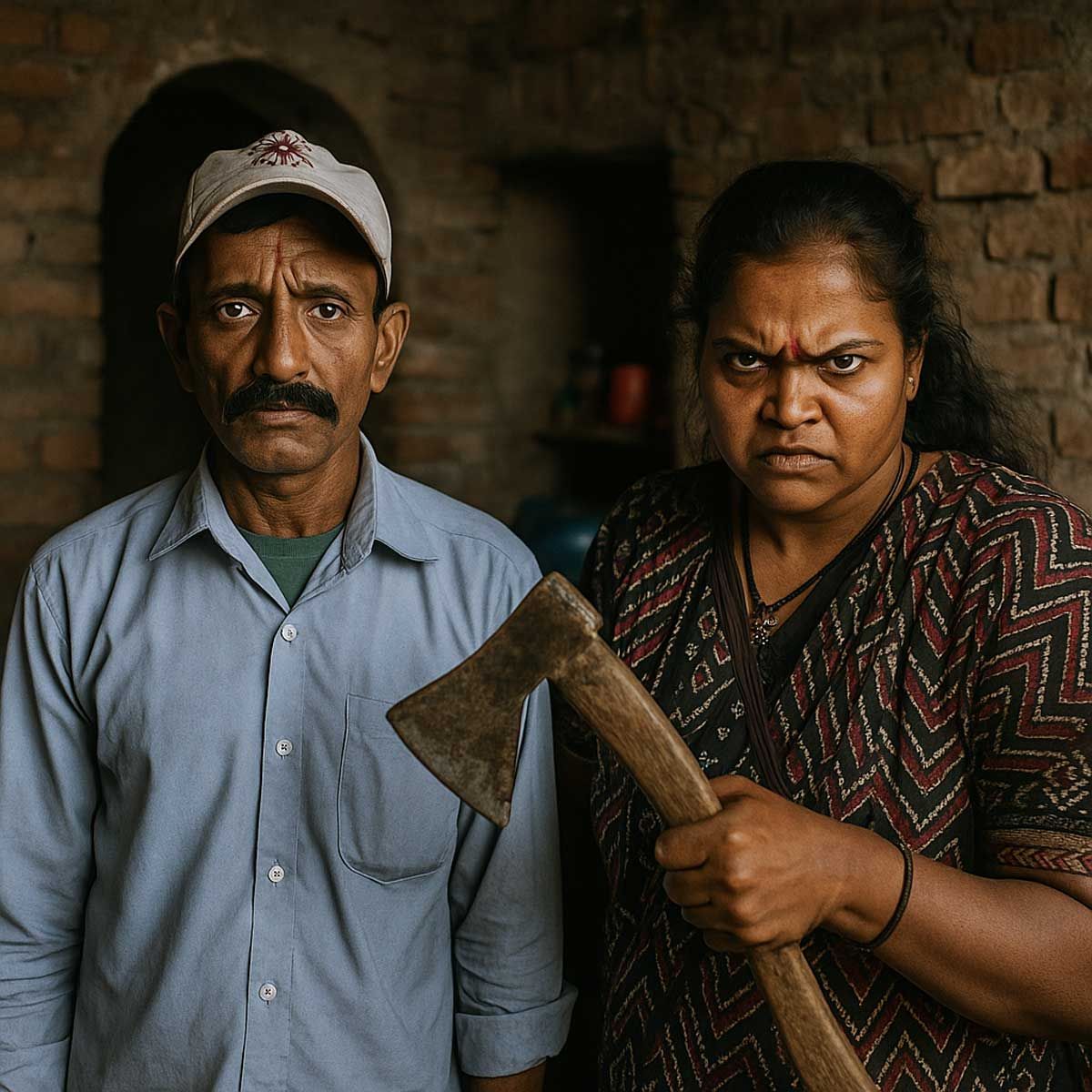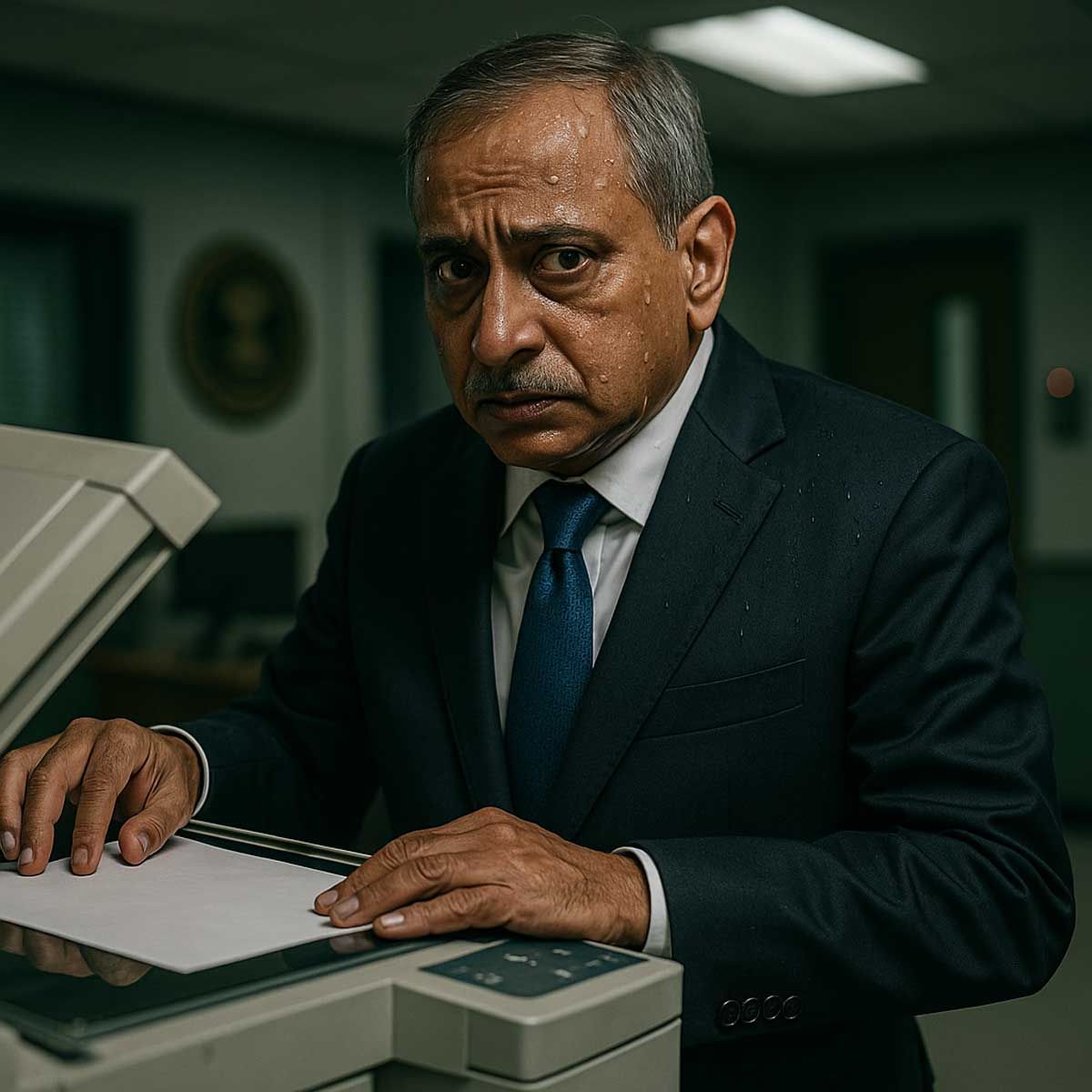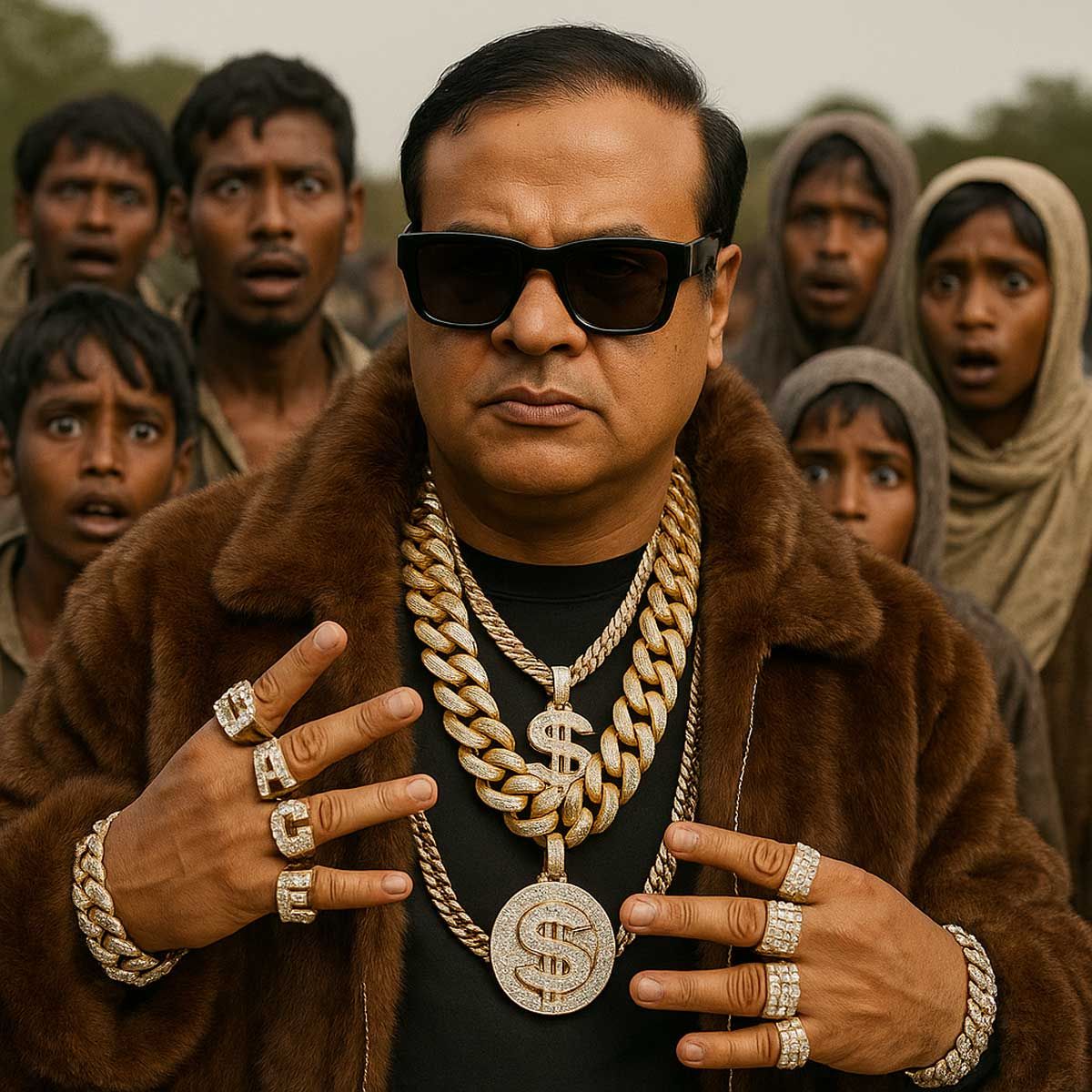More Coverage
Twitter Coverage
Satyaagrah
Written on
Satyaagrah
Written on
Satyaagrah
Written on
Satyaagrah
Written on
Satyaagrah
Written on
JOIN SATYAAGRAH SOCIAL MEDIA
X freezes IAMC & HfHR accounts over Anti-India claims, let's delve deep to uncover HfHR & IAMC's covert anti-Hindu motives, exposing their strategic efforts to malign Hinduism, their narratives highlight a concealed bias against India's diverse spirit

In a significant turn of events, X, the platform formerly known as Twitter, has withheld the accounts of two prominent organizations, the Indian American Muslim Council (IAMC) and Hindus for Human Rights (HfHR). These organizations have previously been accused of disseminating anti-India propaganda.
Upon attempting to access the IAMC's account from India, users were greeted with a disclaimer, “@IAMCouncil has been withheld in IN in response to a legal demand. Learn more.”
The Hindu American Foundation (HAF) has shed light on the alleged links between the IAMC and the prohibited terror group, the Students’ Islamic Movement of India (SIMI). Furthermore, there are claims suggesting that the IAMC has connections with other extremist groups such as Lashkar-e-Taiba (LeT) and Jamaat-e-Islami (JeI), primarily through its founder, Shaik Ubaid.
Positioning itself as a rights advocacy group, the IAMC, backed by Jamaat-e-Islami, has been at the center of several controversies. One of the most notable allegations is the group's supposed collaboration and financial transactions with various US entities, aiming to get India blacklisted by the USCIRF (United States Commission on International Religious Freedom).
|
IAMC and HfHR Under Scrutiny for Misinformation and Anti-Hindu Propaganda on X
The Indian American Muslim Council (IAMC) has previously been embroiled in controversies surrounding the spread of fake news and misinformation aimed at advancing Islamist agendas in India. Their activities culminated in a significant legal action in 2021 when they were charged under the UAPA (Unlawful Activities Prevention Act).
Adding to the list of organizations facing restrictions on X (formerly known as Twitter) is the Hindus for Human Rights (HfHR). Their account has been withheld in India, with a clear message indicating, “@Hindus4HR has been withheld in IN in response to a legal demand. Learn more.”
The open-source intelligence handle, ‘Disinfo Lab’, has previously shed light on HfHR's activities. They highlighted the organization's role in pushing the divisive narrative of ‘Hindu Vs Hindutva’. This is not the only contentious act associated with HfHR. The group openly supported the controversial ‘Dismantling Global Hindutva’ conference.
A striking revelation from Disinfo Lab suggests that the HfHR was established in 2019 through a collaboration between the IAMC and the Organization for Minorities of India (OFMI). This connection further raises questions about the actual intentions and affiliations of these organizations.
The intricate web of associations and affiliations between the Indian American Muslim Council (IAMC), Hindus for Human Rights (HfHR), and the Alliance for Justice and Accountability (AJA) has come into focus once more. These organizations, known for their distinct stances against certain Indian policies and leadership, had joined hands to form the AJA.
According to a report in The Hindu, the AJA was notably active in orchestrating protests against Prime Minister Modi during his visit to Houston on September 22, 2019.
Sunita Vishwanath, a key figure in these circles and the co-founder of HfHR, has been vocal in her criticisms. In 2019, she expressed her deep concerns over the situation in Kashmir and the National Register of Citizens (NRC). She stated, "We are especially appalled by the most recent nightmare of the Kashmiri people, and the situation of 1.9 million people in India who are rendered stateless due to the imposition of the travesty called the National Register of Citizens.”
Vishwanath's affiliations don't end with HfHR. She's also the co-founder of 'Women for Afghan Women'. It's worth noting that this organization is bankrolled by George Soros’ Open Society Foundations (OSF) and Open Society Institute (OSI). The links and motivations behind these organizations and their founders raise questions about their agendas and the forces that influence them.
|
Inside the IAMC: Advocacy or Agenda?
The Indian American Muslim Council (IAMC), known earlier as the Indian Muslim Council-USA, portrays itself as the beacon of advocacy for Indian American Muslims, having several chapters spread across the United States. Their stated mission revolves around promoting pluralism and religious freedom in India and championing the cause of the Indian Muslim diaspora in the U.S.
Diving into its roots, the IAMC was birthed in 2002 by Sheikh Ubaid in the aftermath of the Godhra riots. With Rasheed Ahmed at the helm, who previously served as the executive director (2008-17) of the Islamic Medical Association of North America (IMANA), the organization has seen its fair share of controversies. Notably, IMANA faced allegations of misappropriating public COVID funds. Adding to the intrigue, Zahid Mahmood, IMANA’s Director of Operations, previously served in the Pakistan Navy.
Touting itself as "the largest advocacy organization of Indian Muslims in the US" on its website, the IAMC hasn't shied away from vocalizing its concerns about perceived injustices against minorities in India. Yet, their actions raise eyebrows. As per a News18 report, the IAMC allegedly channeled funds intended for the Rohingya crisis to the lobbying firm FGR. The ultimate aim? To have India blacklisted by the United States Commission on International Religious Freedom (USCIRF).
Such activities inevitably lead to questions about the IAMC's true intentions and whether their advocacy is genuinely for pluralism or if there's a deeper agenda at play.
Diving deeper into the web of associations surrounding the Indian American Muslim Council (IAMC), it becomes evident that there's more beneath the surface. Notably, the head of FGR, Terry Allen, has close ties with Nadine Maenza, the chair of USCIRF. But the string of associations doesn't end there. Sheikh Ubaid of the IAMC is known to be friends with Abdul Malik Mujahid, who once led the Islamic Circle of North America (ICNA). ICNA, for those unaware, is the recognized U.S. front for Pakistan's Jamaat-e-Islami.
And the trail continues. The ICNA has been tied to Pakistan-based terror groups, including the infamous Lashkar-e-Taiba (LeT).
The connections of the IAMC were put under the spotlight after the events of 26 January. Minority affairs minister, Mukhtar Abbas Naqvi, drew attention to the alleged ties of the IAMC with the Students’ Islamic Movement of India (SIMI) and Pakistan's ISI. "This Indo-American Muslim Council, which has been linked with SIMI and ISI in the past and has been involved in propagating anti-India sentiments and targeting PM Modi, is at it again," Naqvi commented.
During an online event, former Vice President Ansari voiced his concerns, hinting at a shift in India's socio-political landscape. He mentioned that the country has recently been witnessing trends that challenge the established notion of civic nationalism.
The ties, the statements, and the events paint a picture that suggests the IAMC's activities go beyond mere advocacy, raising questions about their broader intentions and the impact on India's global image.
In a recent discourse last year, the theme of India's democracy and its purported decline took center stage as former Vice President Ansari provided a scathing critique, suggesting a shift from the well-entrenched civic nationalism to an imagined cultural nationalism. He depicted a worrying scenario where an electoral majority is masked as a religious majority, aiming to monopolize political power. Ansari expressed concern over attempts to differentiate citizens based on faith, promoting intolerance, and sowing seeds of 'otherness'. He stated, "Recent manifestations are chilling and reflect poorly on our claim to be governed by the rule of law."
Ansari's words were echoed by global voices. Notably, US Senator Ed Markey and Congressmen Jim McGovern, Andy Levin, and Jamie Raskin participated in the discussion. Markey, a known critic of India's policies, had previously opposed the India-US civil nuclear deal. The trio of McGovern, Levin, and Raskin too have been vocal about their reservations concerning India, regardless of the ruling party.
Levin, in his statement, presented a grim picture of India's democratic health. He mentioned, "Regrettably, today, the world's largest democracy is seeing backsliding, with human rights under attack and a surge in religious nationalism." Citing indices, he highlighted India's drop in global democracy rankings since 2014 and its downgrade by Freedom House from 'free' to 'partly free'.
Such observations, while reflecting individual perspectives, underline the growing concern about India's democratic fabric, both nationally and internationally. Whether these are mere opinions or point to a larger truth remains a subject of intense debate.
|
IAMC's Contentious Stance and the Law: A Look Back
Last year, the Indian American Muslim Council (IAMC) found itself in the eye of a storm, following allegations by minority affairs minister Mukhtar Abbas Naqvi. Naqvi claimed that IAMC had ties with Pakistan's ISI and the banned Students’ Islamic Movement of India (SIMI).
In a staunch defense, the IAMC outrightly denied these claims, emphasizing their clean track record. They issued a challenge to the government, urging it to present credible evidence for these "baseless and fraudulent claims". The council reaffirmed its stance, stating, "IAMC does not have ties to Pakistan, ISI or SIMI. IAMC has zero history of spreading communal violence in India.”
Furthermore, the IAMC highlighted the frequent bans imposed on SIMI under the Unlawful (Activities) Prevention Act since 2001. They pointed out that during these numerous legal evaluations, the Indian federal government never once linked IAMC to SIMI.
However, this wasn't IAMC's first brush with controversy. In a significant development the previous November, over 100 social media accounts, including IAMC's, faced legal scrutiny. They were booked under the Unlawful Activities (Prevention) Act (UAPA). The charge? Allegedly sharing fabricated visuals of a mosque burning in Tripura. The Ministry of Home Affairs (MHA) dismissed these circulating stories of violence in Tripura as baseless. The MHA went on record to state that no such incidents of injury, death, or other grievous harm as reported in certain social media posts had occurred in Tripura.
This episode reiterates the complexities and challenges of discerning truth in the age of digital media, where misinformation can spread rapidly and cause wide-scale unrest.
|
Decoding "Hindus for Human Rights": Behind the Facade
Appearances can be deceiving, especially in the world of non-profit organizations where names and mission statements can often mislead the uninformed observer. One such entity that has recently come into the limelight is the "Hindus for Human Rights" (HfHR). Upon closer examination, the group's name and professed aims appear to be incongruent with its actions and affiliations.
Established in 2019 and headquartered in Brooklyn, USA, HfHR was co-founded by Sunita Vishwanath and Raju Rajagopal. Both have a track record of involvement in activities that have been critical of Hindu interests and India's stance on various issues. Their mission, as per their official documentation, is to "advocate for pluralism, civil, and human rights in South Asia and North America."
The Irony of The Name | The name "Hindus for Human Rights" might suggest an organization dedicated to upholding the rights of Hindus. However, a deeper dive reveals a different story. The organization has consistently shown alignment with groups known for their pro-Pakistan leanings and anti-Hindu sentiments. Their associations include ties with organizations like ICNA, JFA, IAMC, and CAIR, many of which have been vocal critics of India, especially on the Kashmir issue.
While HfHR proclaims to champion human rights, their selective silence on several significant issues is telling. Notably, they have never publicly condemned or even acknowledged the atrocities committed against Hindus, making their commitment to "human rights" seem rather one-sided.
This analysis leans heavily on the insights provided by Disinfo Lab in their report titled "Operation TUPAC – Decoding the Longest War." The report sheds light on several organizations operating under the guise of human rights advocacy, which, in reality, have ulterior motives.
To the discerning reader, the takeaway is clear: always look beyond the surface. In an era where information is abundant, it's crucial to differentiate between genuine advocacy and agenda-driven propaganda.
|
Peeling Back the Layers: The Intricacies Behind HfHR's Founders
In the realm of advocacy and activism, it is not uncommon to find interconnections between various organizations, often leading back to a few central figures. Such seems to be the case with the "Hindus for Human Rights" (HfHR) and its co-founders' previous affiliations.
Raju Rajagopal, a name now synonymous with HfHR, has a past steeped in activism and advocacy. Prior to HfHR, he was instrumental in founding EKTA and Coalition against Communalism (CAC). What ties these organizations together is their association with the Coalition Against Genocide (CAG), a group that saw its inception under the guidance of Angana Chatterji and Shaik Ubaid.
Shaik Ubaid, another key figure in this narrative, was the brain behind the Indian American Muslim Council (IAMC), originally known as IMC-USA. The IAMC was also a constituent of CAG. Interestingly, the digital footprints of EKTA and CAC seem to have been dormant for an extended period, yet their paper trail remained active, often lending their names to various campaigns and coalitions, including the CAG.
A closer look at the online presence of CAC and EKTA reveals intriguing details. Their domain structures, namely www.cac.ektaonline.org and www.ektaonline.org, suggest a shared management, indicating that these entities, while appearing independent, might be more intertwined than they seem.
This modus operandi is reflective of a broader pattern observed within the IAMC and its partners. They are known to create multiple entities, seemingly independent but intrinsically connected. A case in point is Pieter Friedrich, a known activist, who, in a convoluted move, used two distinct identities to endorse an event orchestrated by his primary persona at Stanford University.
The intricate web of affiliations and the duality of identities employed by key figures in this space underscores the importance of diligent research. It is imperative to understand the nuances and interconnections behind organizations and their founders, especially when they wield influence in shaping public opinion. The story of HfHR and its founders serves as a poignant reminder of the intricate dance between advocacy, activism, and the shadows that often lurk behind the scenes.
In 2003, Rajagopal took to the stage at an IAMC event, where he was not just a mere participant but a distinguished speaker. While the evidence of his presence was subsequently removed from the main pages of the IAMC website, it still lurks in the blog sections, hinting at his significant role within the organization.
Fast forward to 2005, Rajagopal found himself amidst a contentious debate – the California Textbook Controversy. The controversy revolved around the representation of Hinduism in school textbooks, which many believed portrayed the religion in a negative light, especially when compared to other world religions. Instead of aligning with those advocating for a balanced portrayal, Rajagopal took a contrary stance. He opined that children should be exposed to India's pluralistic traditions and foster discussions on racism, caste, and gender bias. However, his use of the term "discussion" seemed more like a veil, with many interpreting his intent as a stark denunciation of Hinduism.
Rajagopal's history, filled with controversies and participation in various advocacy events, paints a picture of a man deeply enmeshed in the socio-political debates surrounding India and its diaspora. It also underscores the importance of understanding the motivations and backgrounds of those shaping public discourse.
|
Sunita Viswanath's Intricate Web of Connections
Sunita Viswanath, also known as Sunita Mehta, is the other notable figurehead behind the 'Hindus for Human Rights' (HfHR) organization. Her journey has been filled with diverse engagements, relationships, and advocacy efforts. Initially married to renowned author Suketu Mehta, with whom she has two sons, she later tied the knot with Stephan Shaw, a Jewish individual deeply affiliated with the Jewish Voice for Peace (JVP). Interestingly, JVP collaborates closely with the pro-Muslim Brotherhood faction, Americans for Palestine (AMP).
Viswanath's activism isn't limited to HfHR. She has been an instrumental figure in the establishment of several organizations. One of her earliest ventures in 2002 was co-founding 'Women for Afghan Women (WAW)', an initiative dedicated to the welfare and rights of marginalized Afghan women, both in Afghanistan and New York. This organization boasts of significant backers, including The Ford Foundation and the Open Society Institute.
By 2011, Viswanath's focus shifted towards Hinduism when she co-established 'Sadhna: Coalition of Progressive Hindus.' This organization, branding itself as a representative of US-based progressive Hindus, has a controversial reputation. An example of its contentious stances was evident when a now-deleted blog from a Sadhna writer attempted a feminist and marginalized interpretation of Sita's 'agnipariksha' from the Ramayan. The post portrayed Rama in a negative light, suggesting his inability to rise above petty gossip. The narrative took a further divisive turn, offering a disrespectful interpretation of Sita's ordeal. Such instances reveal a pattern: while the surface-level intent appears to promote human rights, the underlying agenda seems more inclined towards provoking and offending the Hindu community.
Sunita Viswanath, in addition to her roles in various organizations, holds a significant position as the Associate Director and Religious Life Advisor at Columbia University. Her previous roles also include being the ex-Associate Director at the Soros Reproductive Health Fellowship. Her affiliations don't end here; she is associated with the newly-formed Netherlands-based organization, Foundation The London Story, serving on its advisory board. Registered as Stitching The London Story in March 2020, this foundation claims to combat "misinformation, disinformation, hate speech, and online propaganda." Yet, a closer look reveals an ironic twist: while denouncing such practices, certain actions and affiliations of the organization mirror the very issues they claim to fight against.
|
Such contradictions become clearer when examining the backgrounds of the foundation's board members. One notable figure is Rasheed Ahmed, who has served as the Executive Director of the Indian American Muslim Council (IAMC) since 2010-11. He also held a position at the Islamic Medical Association of North America (IMANA) from 2008 to 2017. IMANA has been in the spotlight for dubious activities, notably the alleged misappropriation of funds during its 2021 #HelpIndiaBreath campaign, intended to assist India during the Covid crisis.
Furthermore, Hindus for Human Rights (HfHR), under Viswanath's leadership, frequently collaborates with the Organization for Minorities of India (OFMI), led by Bhajan Singh Bhinder & Pieter Friedrich. This trio of organizations, HfHR, OFMI, and IAMC, jointly sponsored a briefing titled “1984-2002 Justice Delayed and Denied” in Washington DC, in October 2019. The event featured a roster of speakers, including Human Rights Lawyer Rajvinder Singh Bains and Sunita Viswanath herself.
This intricate web of connections raises questions about the true intentions behind these organizations and the narratives they push forward. The consistent undercurrent is clear: while outwardly advocating for justice and rights, there's an underlying agenda that seems to challenge and, at times, distort Hinduism's essence.
The Organization for Minorities of India (OFMI) recently faced a major setback following revelations of its alleged involvement in terrorist activities. This was detailed in the Disinfo Lab's report “The Un-Ending War Part 1” published in February 2021. Since then, OFMI's operations have been largely dormant, with their Twitter handle barely showing any activity except for the occasional retweet, notably from figures like Shaik Ubaid, IAMC, Audrey Truschke, CJ Werleman, and its founder, Pieter Friedrich.
But this isn't where the connections end. The Hindus for Human Rights (HfHR) group, co-founded by Sunita Viswanath, is closely affiliated with OFMI and other organizations through the Alliance for Justice and Accountability (AJA). This coalition of groups was notably active during the visit of the Indian Prime Minister to Houston on September 22, 2019. Not only did IAMC and HfHR participate in the protests, but some protestors even sported #FreeKashmir t-shirts, a slogan commonly associated with Jamaat-linked organizations and Pakistan.
The narrative being pushed by these groups is clear: there's a consistent and concerted effort to challenge Hinduism and its principles. Two core sources drive their animosity towards Hinduism. The first is rooted in orthodox Muslim beliefs that seek to eradicate idolatry. The second is the Marxist-Leninist agenda to abolish religion, with a particular emphasis on targeting what they perceive as the 'weakest' religion. Their strategy is evident: use Hindus against Hinduism. By controlling the narrative, these groups aim to weaken the foundations of Hinduism. And it's essential for us to recognize these patterns and understand their underlying motives.
|
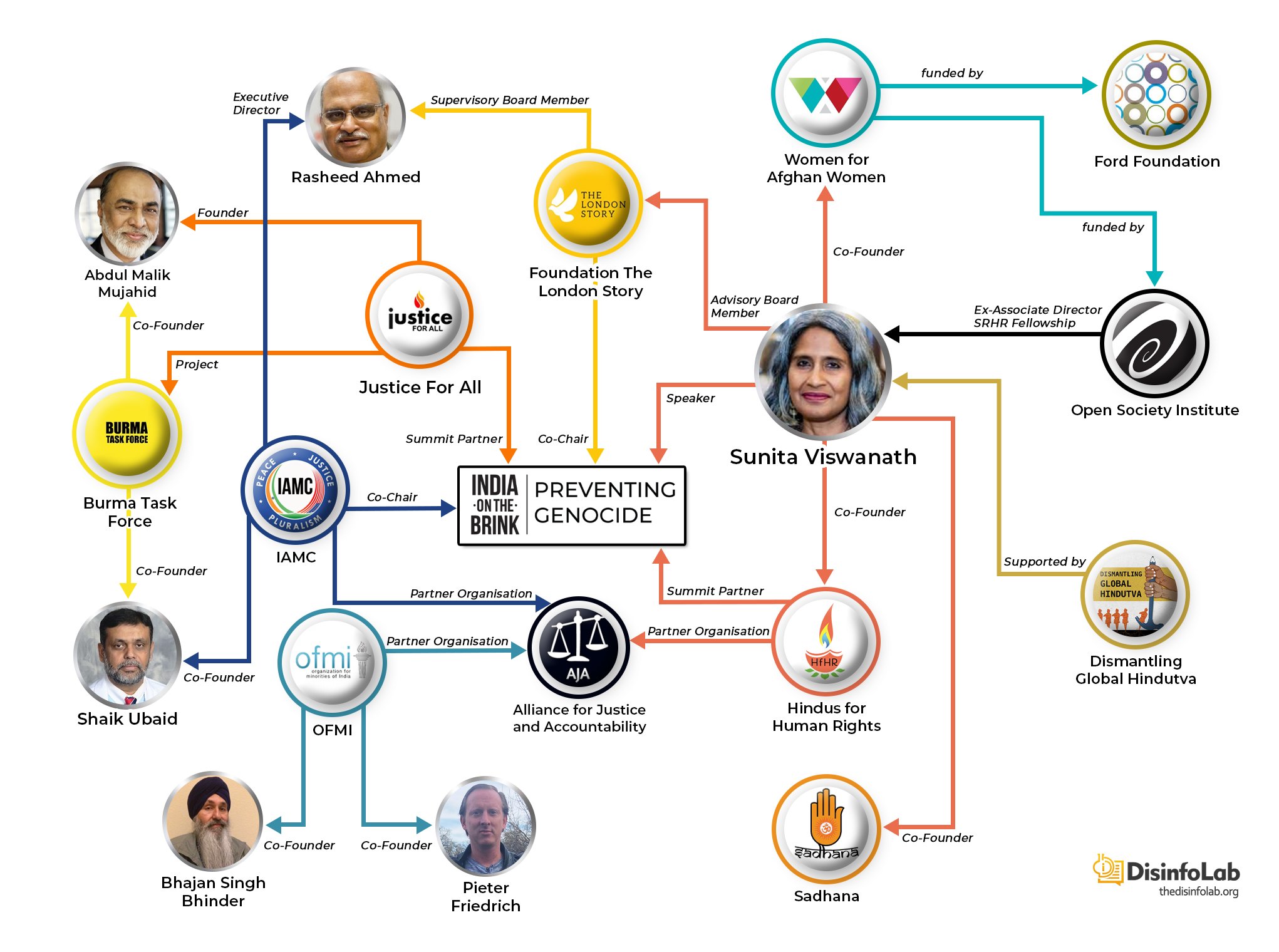 |
Examples of HfHR’s Anti-Indian and Anti-Hindu Activities:
1. Opposition to Article 370 Revocation: In December 2019, the IAMC held a 'Congressional Briefing' event to express their disagreement with the Indian government's decision to nullify Article 370 in Kashmir. This Article had previously granted special autonomy to the state of Jammu and Kashmir. HfHR, along with various other organizations, publicly supported the 'Stand with Kashmir' initiative, which leans towards advocating for Kashmir's secession from India. These 'Congressional Briefings', while sounding formal and significant, often seem to be gatherings of like-minded individuals with occasional representation from a few politicians.
2. Support for Koregaon Violence Convicts: HfHR prominently stood among the many entities protesting the arrest of Dr. Anand Teltumbde and Gautam Navlakha. These individuals were implicated in the Bhima Koregaon case of 2018, accused of instigating violence, conspiring against the state, and allegedly plotting the assassination of the Indian Prime Minister. They, along with other accused, were charged under the stringent Unlawful Activities (Prevention) Act (UAPA) for having links with extremist Maoist factions.
Gautam Navalakha's affiliations bring forth concerns. He frequently attended events organized by Ghulam Nabi Fai. The FBI has linked Fai's organization to receiving finances from Pakistan's intelligence agency, ISI, with the purpose of furthering a Kashmiri separatist agenda in the US.
Adding complexity to this narrative is the recent death of Milind Teltumbde, a senior Maoist leader and younger sibling of Anand, during an encounter with Indian security forces. His associations and activities shed additional light on the broader concerns surrounding HfHR's positions and endorsements.
3. Congressional Resolution on Kashmir: In January 2020, HfHR showed its support for Congresswoman Pramila Jayapal's Resolution (HR745) regarding Kashmir. The organization encouraged global intervention, urging nations to maintain pressure on India to alleviate the suffering of the Kashmiri populace. However, their focus seems singularly directed towards the Kashmiri Muslim community. Notably, January 2020 marked three decades since the mass exodus and ethnic cleansing of approximately 400,000 Kashmiri Hindus. The silence of HfHR on this matter raises questions about its impartiality and genuine concern for human rights.
4. Opposition to CAA/NRC: HfHR, in conjunction with AJA and Equality Labs, launched a concerted social media campaign against the Citizenship Amendment Bill (CAB) and the National Register of Citizens (NRC). Equality Labs was previously highlighted in the "UNENDING WAR Part 1" report for its alleged ties with Bhinder and OFMI. Both CAB and NRC have been points of contention, with concerns about their potential impact on India's minority populations.
5. 'Dismantling Global Hindutva' Conference: September 2021 saw the convening of a virtual event titled 'Dismantling Global Hindutva'. Prominent figures known for their critical views on Hinduism and India, such as Audrey Truschke, Suchitra Vijayan, Dr. Meena Kandasamy, and Meena Dhanda, spearheaded this conference. The event was heavily promoted by groups including IAMC, HfHR, and Pieter Friedrich, with noticeable support from various Pakistani social media accounts. The apparent bias and the selective narrative presented at such events continue to fuel debates about the genuine intent behind these gatherings.
6. Holi Against Hindutva: In the year 2020, the HfHR, together with IAMC, threw its weight behind the campaign "Holi Against Hindutva". They lauded the initiative for its innovative tactics and the youthful zeal driving it. The campaign aimed to use the festival of Holi as a platform to highlight and protest against what they perceived as the rise of Hindutva ideologies in India.
7. 'India on the Brink' Conference: More recently, the "Foundation London Story", in collaboration with HfHR, IAMC, JFA, and several other entities, hosted a three-day conference from February 26-28, 2022, titled “India on Brink”. This event was designed to discuss and propagate the notion that India is on the precipice of a large-scale genocide. Notably, many of the event's speakers were associated with Jamaat-e-Islami, an organization with purported links to terror groups.
Raju Rajagopal, the co-founder of HfHR, has been closely associated with organizations linked to Jamaat-e-Islami. This connection was further highlighted when he conducted an extensive interview with Hena Zuberi, the Director of JFA, on September 15, 2020. During this discourse, Rajagopal delved into the Delhi riots and the controversies surrounding the CAA. Although the recording of this interview was later removed from the official HfHR website, it remains available for viewing on the YouTube channel associated with Muslim TV and JFA.
These ongoing activities and collaborations of HfHR underscore the organization's consistent stance on various political and socio-religious matters pertaining to India.
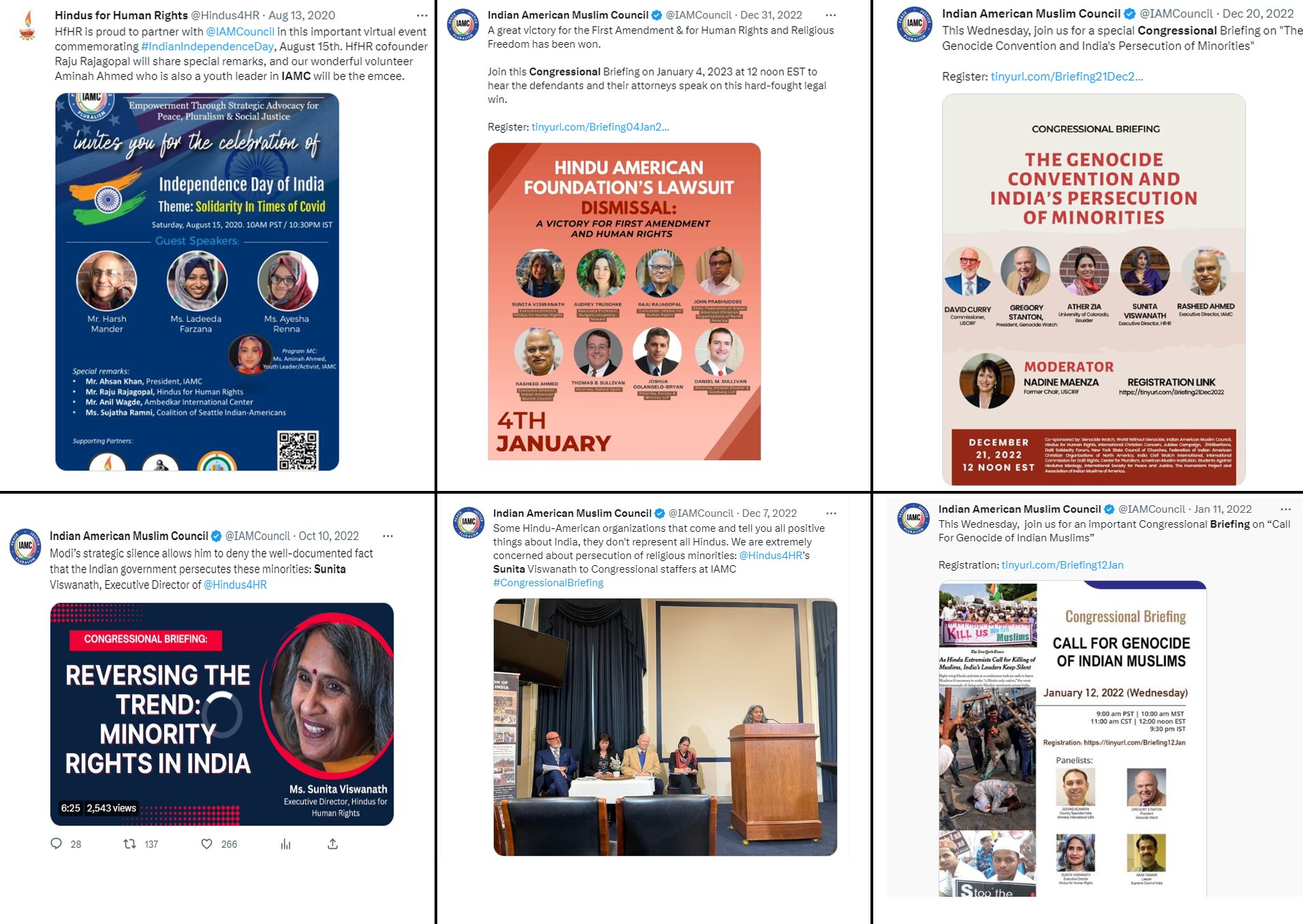 |
Conclusion: The Anti-Hindu Narrative
The continuous campaign against Hindus and Hinduism by organizations like HfHR and their counterparts is a matter of deep concern. It's essential to recognize that these organizations, instead of operating as isolated entities, function cohesively, reinforcing a shared narrative that aims to demonize and malign Hindus and Hinduism. The narrative they push is analogous to the prejudice and hatred that the Jews faced from the Nazis in the early 20th century. The irony, however, is in their audacity to label Hindus as the "Nazis" of today, a twisted play of words that seeks to invert reality.
Historically, several of these organizations found a conducive environment during the era of Nehruvian governance, which, at times, leaned towards an anti-Hindu rhetoric. Their influence persisted across subsequent governments that echoed similar sentiments. However, with the rise of the BJP, a party that prioritizes pluralism and development, the relevance of these organizations within India has waned. Their diminishing influence is not, as they claim, a result of curtailed freedom of speech, but rather an outcome of their biased agendas being exposed.
In response, these organizations have shifted their focus to the West, particularly targeting the Anglo-American academic sphere to further their narrative. It is imperative that Hindus, both in India and globally, remain vigilant, aware, and united against such baseless and harmful propaganda. The path forward requires clarity, unity, and the resilience to counter false narratives with truth and facts.
References
https://corponline.dcra.dc.gov/BizEntity.aspx/ViewEntityData?entityId=4250725
https://www.hindusforhumanrights.org/en/our-vision
https://www.icna.org/social-justice/icna-csj-helps-coordinate-massive-rally-at-un/
https://iamc.com/press-release/imc-usa_to_hold_first_ever_convention_of_its_kind_on_india-related_issues
https://iamc.com/imc-usa_to_hold_first_ever_convention_of_its_kind_on_india-related_issues/
https://www.encyclopedia.com/arts/educational-magazines/mehta-sunita-sunita-b-mehta
https://opencorporates.com/events/466486874
https://womenforafghanwomen.org/funding-partners/
https://www.sadhana.org/mission-vision-values
https://www.sourcewatch.org/index.php/Sunita_B._Mehta
https://www.kvk.nl/orderstraat/product-kiezen/?kvknummer=77721306
https://thelondonstory.org/about-us/
https://twocircles.net/2010dec16/imcusa_now_indian_american_muslim_council_iamc.html
https://web.archive.org/web/20201028134057/https://www.iamc.com/iamc-announces-new-executive-team/
IMANA raised funds by exploiting India’s goodwill during Covid crisis (Part II) | CanIndia News
THE UN-ENDING WAR: From Proxy War to Info-War against India – DisinfoLab (thedisinfolab.org)
https://iamc.com/aja-indian-americans-announce-protest-against-modis-houston-visit/
https://en.shafaqna.com/126803/dr-gregory-stanton-genocide-of-muslims-in-kashmir-assam-a-step-away/
https://twitter.com/IAMCouncil/status/1207718147643650049
https://web.archive.org/web/20210411101220/
https://standwithkashmir.org/statement-of-solidarity-with-kashmir/
https://web.archive.org/web/20200424165934/
https://www.hindusforhumanrights.org/blog/statement-by-hindus-for-human-rights-and-global-indian-progressive-alliance-protesting-the-arrest-of-dr-anand-teltumbde-and-gautam-navlakha
https://www.indiatoday.in/india/story/varavara-rao-gautam-navlakha-sudha-bhardwaj-arrested-1325320-2018-08-28
https://economictimes.indiatimes.com/news/politics-and-nation/elgar-case-activist-teltumbde-arrested/articleshow/75148112.cms?from=mdr
https://groups.google.com/g/alt.education/c/ZAcp7c96-bY
https://indianexpress.com/article/india/naxals-killed-cops-injured-encounter-maharashtras-gadchiroli-7621407/
The Kashmiri Pandits: An Ethnic Cleansing the World Forgot (satp.org)
THE UN-ENDING WAR: From Proxy War to Info-War against India – DisinfoLab (thedisinfolab.org)
https://www.hindusforhumanrights.org/en/blog/mass-resistance-actions-against-nrc-and-cab
Dismantling Global Hindutva (dismantlinghindutva.com)
https://nationalhistorycenter.org/about/program-descriptions/congressional-briefings/
Holi Against Hindutva – South Asian Activism And The Peddling Of Hinduphobia (hindupost.in)
India on the Brink
https://www.youtube.com/results?search_query=Justice+for+all%3A+India+Delhi+pogram
 Support Us
Support Us
Satyagraha was born from the heart of our land, with an undying aim to unveil the true essence of Bharat. It seeks to illuminate the hidden tales of our valiant freedom fighters and the rich chronicles that haven't yet sung their complete melody in the mainstream.
While platforms like NDTV and 'The Wire' effortlessly garner funds under the banner of safeguarding democracy, we at Satyagraha walk a different path. Our strength and resonance come from you. In this journey to weave a stronger Bharat, every little contribution amplifies our voice. Let's come together, contribute as you can, and champion the true spirit of our nation.
 |  |  |
| ICICI Bank of Satyaagrah | Razorpay Bank of Satyaagrah | PayPal Bank of Satyaagrah - For International Payments |
If all above doesn't work, then try the LINK below:
Please share the article on other platforms
DISCLAIMER: The author is solely responsible for the views expressed in this article. The author carries the responsibility for citing and/or licensing of images utilized within the text. The website also frequently uses non-commercial images for representational purposes only in line with the article. We are not responsible for the authenticity of such images. If some images have a copyright issue, we request the person/entity to contact us at This email address is being protected from spambots. You need JavaScript enabled to view it. and we will take the necessary actions to resolve the issue.
Related Articles
- Why India’s temples must be freed from government control
- ‘State in denial, admin lied about no complaints being filed, prima facie evidence of violence’: Everything Calcutta HC said on Bengal post-poll violence
- "Your intentions and actions create ripples in the universe. Make them count": Avtar Singh Khanda, an asylum seeker Khalistani terrorist passed away in a UK hospital in Birmingham late last night after NIA released 45 wanted criminals for identification
- Congress leader spreads vaccine hesitancy again, this time claims newborn calves are slaughtered for their serum. Here is the truth
- Adani battles Subramanian Swamy's nefarious and disgusting attempts to link them to Uttarkashi tunnel collapse, claim that was started by propaganda site The Wire, Adani Group slams condemnation, the truth stands tall – no involvement, no compromise
- Exposed: Nitasha Kaul's ban from India, justified by her deep ties with anti-India groups & spreading venom, from testifying against India in US Congress to associating with extremist organizations, her actions reveal an agenda far from scholarly debate
- "Hate is too great a burden to bear": As India strides towards development, IIT Delhi's Prof. Divya Dwivedi incites anger, calling for the wiping out of Hinduism at the global G20 Summit, fostering division rather than appreciating the nation's progress
- खिलाड़ियों का धार्मिक आधार पर खालिस्तानी आतंकियों को महिमामंडित करना: खतरा कितना बड़ा है?
- Here is a list of 20 incidents where the ‘Jai Shri Ram’ slogan has been misused to turn a random crime into ‘hate crime’
- "mein pehley to Musalmaan hoon… If they say Pakistan Murdabad, I will say Pakistan Zindabad," declares Mohammad Akbar Lone, represented by Kapil Sibal in Article 370 abrogation case, stirring a nationwide discourse on allegiance and constitutional loyalty
- Hyundai celebrating ‘Kashmir Solidarity Day’ had been facing nationwide boycott calls in India: Issues second statement that post by Pakistani counterpart unauthorised, expresses ‘regret’ for pro-terrorist stand
- Hyundai India promotes disintegration of Jammu and Kashmir from the Union of India: Started blocking netizens after they question whether they endorse their Pakistani counterpart’s views on Kashmir
- "Professor Schooled": OP Jindal University slams an 'activist' for anti-Hindu remarks in a Palestine issue talk, also issuing a stern warning to Professor Sameena Dalwai over discrimination against Hindu students - a bold stand for fairness in academia
- Lt Col Purohit's shocking testimony to the NIA court exposes torture by ATS to force accusations against RSS, VHP, and Yogi Adityanath in the Malegaon blast, revealing deep-seated plots involving ISI agents and an attempt to coin the term 'Saffron Terror'
- "Ummah Brotherhood over Motherland": "J&K's bold move: 4 government employees - a doctor, constable, teacher, and a lab bearer - terminated for terror links, showcasing a resolute crackdown on internal threats and corruption within the state's machinery















